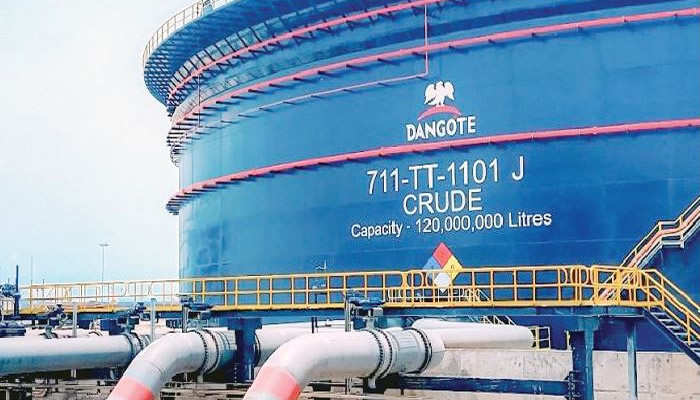Experts attribute Dangote’s petrol price cut to falling crude oil prices, Crude-for-Naira deal
By Yunus Yusuf
Some oil and gas experts have linked the recent reduction in petrol prices by Dangote Petroleum Refinery to the decline in global crude oil prices and the potential reintroduction of a “crude-for-naira” agreement.
Experts who spoke in a seperate interviews with the Business intelligence (TBI Africa) attributed the adjustment to several key factors, including the impact of falling crude prices and the anticipated return of the crude-for-naira arrangement.
It would be recalled that the price cut, announced by Dangote Refinery on April 10, reduced the petrol pump price to ₦865 per litre from ₦880.
Mr. Henry Adigun, an oil and gas consultant, commended Dangote Refinery for its proactive decision, suggesting that the Federal Government’s stance on crude-for-naira deals might have contributed to the price reduction.
He highlighted that the decrease in crude oil prices has improved refining margins, making the local refinery’s operations more profitable.
Dr. Wumi Iledare, Professor Emeritus of Petroleum Economics at Louisiana State University and Executive Director of the Emmanuel Egbogah Foundation, noted that the price cut was expected given the relatively low crude oil prices.
According to Iledare, the cost of acquiring crude oil accounts for approximately 70-80% of the price of Premium Motor Spirit (PMS), with exchange rates and market fundamentals playing a significant role in the final price.
He emphasised that selling crude in naira could alleviate the exchange rate pressures on local refineries, thereby lowering costs.
Iledare also pointed out that the demand and supply of PMS are relatively stable, with minimal smuggling affecting the local market.
However, he observed that the wholesale PMS market remains dominated by a few major players, creating an oligopoly.
“In such a market structure, product pricing tends to be interdependent until firms achieve their desired market share.
“This inefficiency in pricing is one of the reasons for the establishment of a Petroleum Authority, which aims to create a more competitive pricing model,” he said.
Iledare, however, clarified that the law does not grant the Authority the power to set petroleum product prices.
Dr. Ayodele Oni, a partner at Bloomfield Law Firm, suggested that the price cut could be part of a strategic move to strengthen Dangote Refinery’s position in the market.
Oni speculated that the reduction was aimed at making the refinery a stronger competitor to imported fuel, thus attracting local distributors and retailers to buy domestically produced petrol.
“This approach would not only foster increased competition but also help the refinery gain trust and market dominance.
Oni also proposed that the price drop might reflect efforts to improve operational efficiency at the refinery.
” As the refinery becomes more efficient, the reduction in costs could be passed on to consumers.
” Additionally, he noted that the refinery’s pricing of crude in USD means that fluctuations in the naira’s value or better foreign exchange availability could also be contributing factors.
“I believe this move will benefit the industry by promoting competition, lowering fuel costs, ensuring easier access to petroleum products, and ultimately improving business efficiency in the country.
“It also strengthens the nation’s energy security by making domestic sourcing more attractive than relying on imports,” Oni added.
In his view, Mr. Chinedu Ukadike, the National Publicity Secretary of the Independent Petroleum Marketers Association of Nigeria (IPMAN), stated that the reduction in Dangote’s petrol pump price was due to a directive from the Federal Government, which mandated the supply of crude oil in exchange for naira.
He explained that the government’s decision to allow payment in naira rather than dollars has played a significant role in the price reduction, alongside the decline in global crude oil prices.
“This development is expected to enhance the availability of petrol at filling stations at more affordable prices, which is a key component of market dynamics.
” Additionally, it is anticipated to foster healthy competition and contribute to the liberalisation of the petroleum sector,” he added.
Dr. Muda Yusuf, an economist and Chief Executive Officer of the Centre for the Promotion of Private Enterprise, described the reduction as commendable, suggesting it may signal positive developments under the new leadership of the NNPC, with the support of the eoordinating Minister of the economy.
He noted that the move makes sense from both economic and nationalistic perspectives.
“It is especially noteworthy that the arrangement is being fully institutionalized as part of the broader economic management framework,” Yusuf said.
“This is no longer an ad hoc measure. It reflects a focus on energy security, self-reliance, backward and forward integration, multiplier effects, and the conservation of foreign exchange.
“Our appeal is that the government should leave no stone unturned in promoting private sector investment across the economy. This approach should become the standard in all sectors.
“It is not only a patriotic duty but also a fundamental responsibility of government.
” The government’s role is to facilitate—not frustrate—private investment. This is the sure path to sustainable economic growth and development,” he added.




